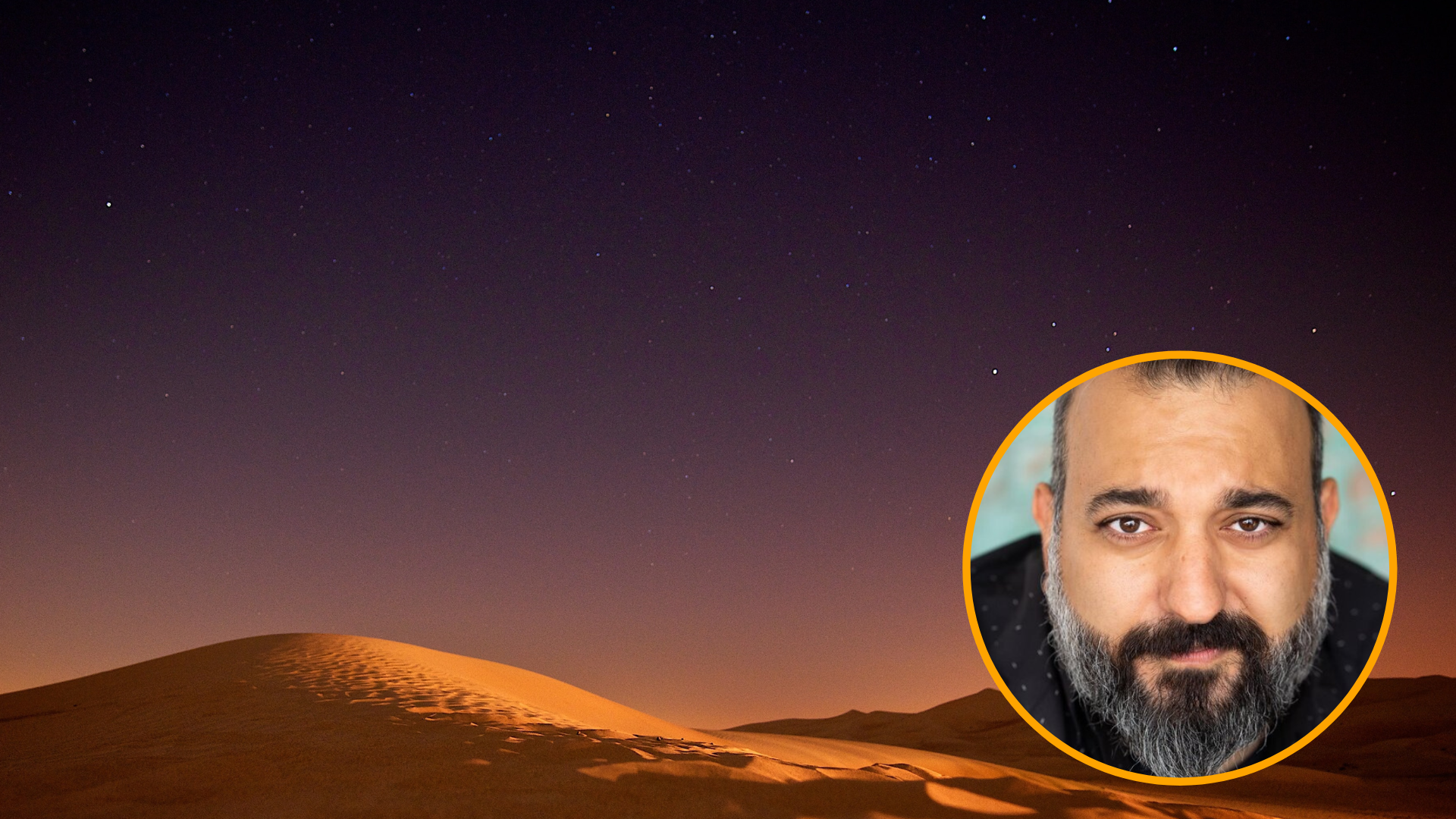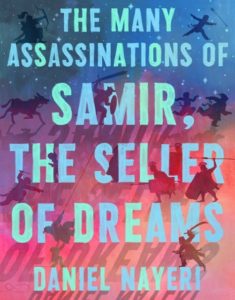
Daniel Nayeri was born in Iran and spent a couple of years as a refugee before immigrating to Oklahoma at age eight with his family. His autobiographical novel, Everything Sad Is Untrue (A True Story) was the winner of the Michael L. Printz Award, the Christopher Medal, and the Middle Eastern Book Award. He is a former publisher, editor, and pastry chef. He lives with his wife and son in an Airstream in one of America's great National Parks.
We talked with Daniel about his next book The Many Assassinations of Samir, the Seller of Dreams, the similarities between our world and the world of the Silk Road, and coping with creative distraction.
 Set along the Silk Road, The Many Assassinations of Samir, the Seller of Dreams follows the attempt of Monkey, an orphaned novice monk, to free himself from Samir—Monkey’s newfound guardian (and a scammer pursued by many an assassin). Hoping to pay off his debt to the “Seller of Dreams,” Monkey decides to try and save Samir’s life six times. What sparked the idea for this story?
Set along the Silk Road, The Many Assassinations of Samir, the Seller of Dreams follows the attempt of Monkey, an orphaned novice monk, to free himself from Samir—Monkey’s newfound guardian (and a scammer pursued by many an assassin). Hoping to pay off his debt to the “Seller of Dreams,” Monkey decides to try and save Samir’s life six times. What sparked the idea for this story?
The Silk Road has always magical to me, but this story began when I was digging into the daily hardships of traveling across the trade routes from Turfan in western China to Samarkand in modern-day Uzbekistan. That particular leg of the Silk Road has the distinction of being the most perilous as it includes a gigantic difference in elevation from the Tarim Basin to the Pamir mountains, as well as the largest shifting sand dune desert in the world, the Taklamakan. As I imagined merchants in caravans marching across such arduous terrain, I wondered if any of them could possibly make the journey with a joyful adventure. Could anyone possibly trek across the desert whistling a tune, telling stories, and laughing at his own jokes? The answer, of course, was Samir the Seller of Dreams, who is essentially my dad, a man who never let reality stand in the way of a good time. In a lot of ways, this book is a love letter to him. In previous work (Everything Sad Is Untrue), I have already written about my mother’s approach to dealing with suffering: her faith. This time, I wanted to write about my father’s approach, which is irreverence for reality itself, or another way to put it: storytelling.
The book paints a rich picture of the historical Silk Road with Monkey and Samir trading and traversing across the Taklamakan Desert as they travel toward Samarkand. How did you go about building this world?
I didn’t feel as though I had to build it, exactly, not in the way I do with a fantasy story. I felt that I was excavating it from historical resources. In one trip to a Silk Road exhibit at UPenn, I saw a petrified pork dumpling from the 5th or 6th century. A pocket of dough, pinched and twisted at the top, akin to a soup dumpling you could get at Joe’s Shanghai in Chinatown or the khinkali dumplings found in modern-day Georgia. I was blown away. We’ve been eating the same things for 1500 years. Near the dumpling was a shoe that wouldn’t have looked out-of-place in that year’s Louis Vuitton collection. I was engrossed by these similarities because otherwise, the Silk Road feels like a completely different world. I wanted to get the differences right, the historical realities, and that took a lot of research. But I was heartened by the fact that people don’t change much.
What was your favorite part of writing this book? Do you have a favorite moment from the book in general?
My favorite scene revolves around a fateful game of chess that Samir plays against a man intent on poisoning him. In a crowded teahouse, after most of Samir’s plans have come to naught, our main character, the young boy named Monkey, is watching and wondering if his master Samir is even interested in winning. He thinks perhaps Samir is willing to die and can’t bear to watch. There is so much heartbreak in the scene, though I won’t say of what kind, and Monkey finally pours out his heart to the room full of strangers. He asks all the questions that a curious young soul would ask of a world so needlessly cruel. And he’s just naïve enough to expect an answer. The answer he gets is my favorite part.
Was there anything you read, listened to, or watched while working on the book that influenced its creation?
Two books that I read a long time ago stuck with me in the writing of this story. The first is Gentlemen of the Road by Michael Chabon, which is another odd couple traveling in a similar time in history. I believe it was inspired by the swords & sorcery genre such as Fritz Leiber’s Fafhrd and the Gray Mouser. The second book was The Thief by Megan Whalen Turner, which is not quite historical. Her world of Attolia is a fictionalized version of ancient Greece, but like Chabon, you can feel the dusty roads under your sandals, smell the oranges in the sun dappled orchards, hear the ocean over a rocky cliff’s edge. I have always wanted to be a wanderer like the kind they describe and hope that Samir would be a welcome traveler to walk alongside them.
Do you ever find it difficult to be creative? What do you do when you are feeling blocked or uninspired?
I feel the opposite of blocked, which is a manic state of constant desperation to finish what I’m working on in order to begin the next idea that is currently dominating my dreamscape. I wish I could draw more, and whittle spoons, and build furniture, and fill all my ramekins with an untried flavor of panna cotta. I have an idea file for novelettes and picture books, interactive stories, stories that are half puzzles, several mystery serials, and an untold number of graphic novels. Creative distraction, I think, is no less a problem than creative congestion.
What is the best thing about writing for younger readers?
Young readers get bored easily, but they don’t get embarrassed…not in the confines of the reading experience, anyway. This means they will let you write about any silly thing, any whimsical premise. They go along with it as long as you obey the ultimate command of keeping it interesting. Adults are the opposite. They hardly get bored, but they feel a sense of embarrassment around what they read. This is the reason adults will affect a public posture of too much dignity in their book selections. Not all adults, mind you. Anyone reading this would be the exception. Anyone they love, also an exception.
What are you currently reading? Are there upcoming books that you are excited about?
I hope and pray Karen Russell is working on something to share with the world. I’m excited for what Patrick deWitt will write next. The Librarianist comes out later this year. He seems to do something new with each book. The same is true of Hal Johnson, whose book Impossible Histories seems like a work of incalculable creative energy and historical knowledge. On the comics side The Golden Age Book 2 by Roxanne Moreil and Cyril Pedrosa is another I’m anticipating. I haven’t gotten my hands on it yet, but the first was a joy. A new Blacksad comic is also out, and I remain a fan of Juan Díaz Canales and Juanjo Guarnido.


